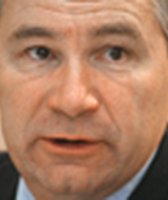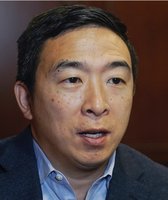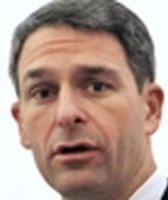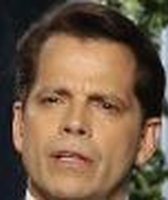Stand up for the facts!
Our only agenda is to publish the truth so you can be an informed participant in democracy.
We need your help.
I would like to contribute
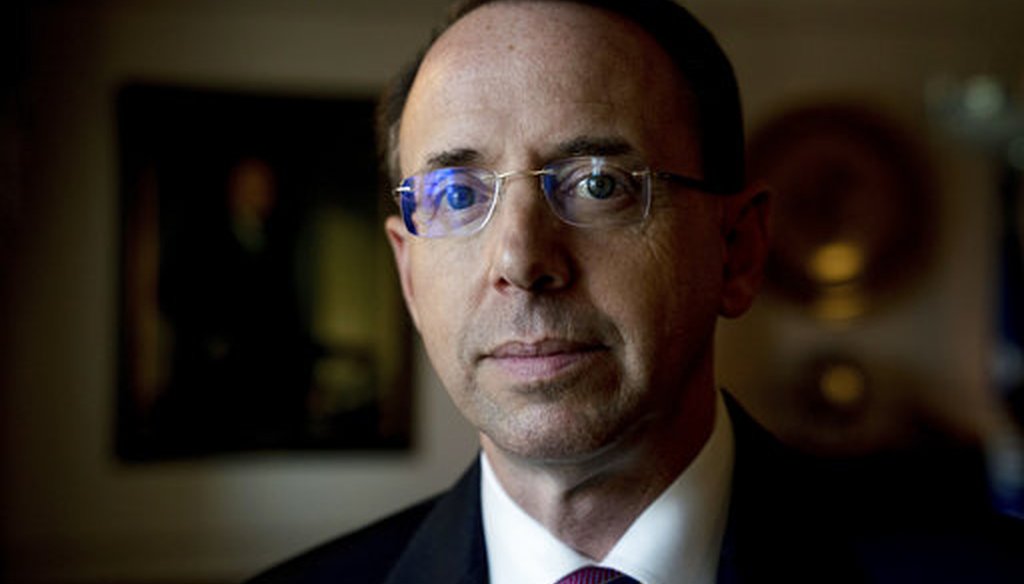
Deputy Attorney General Rod Rosenstein poses for a photograph at the Department of Justice, June 2, 2017. (AP Photo/Andrew Harnik)
Reports that Rod Rosenstein would step down or be fired as deputy attorney general fueled several hours of intense speculation on cable TV about what his departure could mean for the special counsel investigation under his supervision.
Journalists and pundits calmed somewhat after the White House announced Rosenstein would meet later this week with President Donald Trump, suggesting his ouster was not imminent.
Still, in the wake of a New York Times report that Rosenstein in 2017 had speculated about recording conversations with Trump and considered invoking the 25th Amendment to remove him from office, Rosenstein’s long-term status at the Justice Department remains an open question. (Rosenstein has denied the accusations.)
Here, we’ll answer a few questions about what might happen if Rosenstein leaves the Justice Department.
The law is fuzzy on whether a president can directly fire a special counsel, as we’ve explained. But the Justice Department rules are crystal clear about which law enforcement official wields that power.
In this instance, that authority resides with Rosenstein, who’s acting as attorney general in place of Attorney General Jeff Sessions. (Sessions recused himself from the Russia investigation.)
Rosenstein appointed Mueller in May 2017 and has overseen the special counsel’s probe into Russia’s election meddling and the Trump campaign’s contacts with Moscow. Since the appointment, Rosenstein has shown no sign of wanting to impede or end Mueller’s investigation.
"From everything I know there’s no chance that Rosenstein would carry out an order to fire Mueller, at least as things stand now," Louis Seidman, a professor of constitutional law at Georgetown University, told us when we last explored this question.
Rosenstein’s apparent reluctance to hamper Mueller’s probe has long fed suspicions that Trump might try to delegate authority over the probe to more pliant subordinate — a scenario that came into fuller focus with rumors of Rosenstein’s impending departure.
The possibility of Rosenstein’s ouster drew parallels to President Richard Nixon’s "Saturday Night Massacre."
In 1973, Nixon fired Watergate special prosecutor Archibald Cox, even as his top two Justice Department officials — Elliott Richardson and Bill Ruckelshaus — resigned in protest rather than carry out Nixon’s order.
The law is clear about the line of succession under the attorney general if there is a vacancy. It runs first to the deputy attorney general, then the associate attorney general, and then the solicitor general, followed by assistant attorneys general.
During the Saturday Night Massacre, then-Solicitor General Robert Bork eventually followed Nixon’s orders and fired Cox.
James Robenalt, an attorney and an expert on Watergate, said that while many variables surrounding Rosenstein have yet to play out, there’s one constant.
"If Trump tries to shut down the investigation, he will provoke a constitutional crisis," Robenalt said. "Nixon did it to himself in 1973 by firing Cox (and calling it a witch-hunt). Trump may repeat that history."
If Rosenstein were forced out, the line of authority would skip the associate attorney general (which is being handled on an acting basis following the departure earlier this year of Rachel Brand) and go to the solicitor general, Noel Francisco.
But legal experts said Francisco’s filling this role could be problematic. Jones Day, the law firm Francisco left when he became solicitor general in 2017, has represented the Trump campaign.
According to Matthew Miller, a former Justice Department spokesman in the Obama administration, the next in line after Francisco would be Steven Engel at Office of Legal Counsel.
To supervise the Mueller investigation, Francisco would first have to obtain a waiver, said Walter Shaub, who led the U.S. Office of Government Ethics until his resignation in July 2017.
"He has a two-year recusal obligation from any particular matter in which Jones Day is representing a party," Shaub said on Twitter.
Some legal experts noted that Francisco tends to view the presidency as holding broad powers, though it’s unclear how that might translate to his supervision of the Mueller probe.
"It is a bit worrisome that someone with such extreme views on executive privilege would be overseeing the Russia investigation," said Jens David Ohlin, a professor at Cornell Law School. "But I think we should exercise caution here; there’s a lot we don’t know about how Francisco would oversee the Russia investigation.
"It’s hard to predict, based on the public record, how someone would exercise such critical functions in a time of great national import," he added. "Many people rise to the occasion and stand up for the rule of law and I would hope that Francisco would be one of them."
It’s important to note the DOJ regulations set a fairly high bar for firing a special counsel. Doing so requires a good cause, like "misconduct, dereliction of duty, incapacity, conflict of interest, or for other good cause, including violation of departmental policies."
"My view is that Mr. Francisco will be cautious and not try to invoke either of these provisions, especially before the midterms," Robenalt said. "He believes in broad executive power, but is also known as a careful lawyer.
"It will be a different matter if the president orders him to fire Mueller. If that happens, Mr. Francisco will have to make the same decision that Elliot Richardson had to make during Watergate—whether to obey or resign," he added. "Given that the regulations require at least ‘good cause’ to fire, it seems to me that if there is no such justification, Mr. Francisco would have to resign."
Ultimately, if Rosenstein were to vacate his position, the circumstances of his departure may matter a great deal, experts said.
Trump’s firing of Rosenstein could figure as evidence in an obstruction of justice case, if it was done to hand Trump more control over Mueller.
"It would certainly open up a line of investigation in the obstruction of justice probe," Ohlin said. "It might even trigger a constitutional crisis."
If Rosenstein resigned, however, the obstruction problem becomes "much less acute," Ohlin said, because resigning involves "at least some level of personal choice," even if it occurred under intense pressure.
Yet other legal experts said the New York Times report claiming that Rosenstein sought to record or remove Trump gives the president ample reason to fire him without it bearing on an obstruction case.
"It no longer seems likely that the act of firing Rosenstein, if indeed that occurs rather than a resignation, would constitute a plausible obstruction of justice claim," said Joshua Dressler, a law professor at the Ohio State University. "Because of the New York Times article, President Trump can plausibly argue that someone who suggested wearing a wire and potentially invoking the 25th Amendment constitute grounds for his firing."
Our Sources
New York Times, "Rod Rosenstein Suggested Secretly Recording Trump and Discussed 25th Amendment," Sept. 21, 2018
PolitiFact, "Can Donald Trump fire Special Counsel Robert Mueller?" April 12, 2018
Tweet by Walter Schaub, former director of the Office of Government Ethics, Sept. 24, 2018
Tweet by Matthew Miller, former Justice Department spokesman, Sept. 24, 2018
Email interview with Jens David Ohlin, professor at Cornell Law School, Sept. 24, 2018
Email interview with Joshua Dressler, a law professor at the Ohio State University, Sept. 24, 2018
Email interview with James Robenalt, an attorney and an expert on Watergate, Sept. 24, 2018














